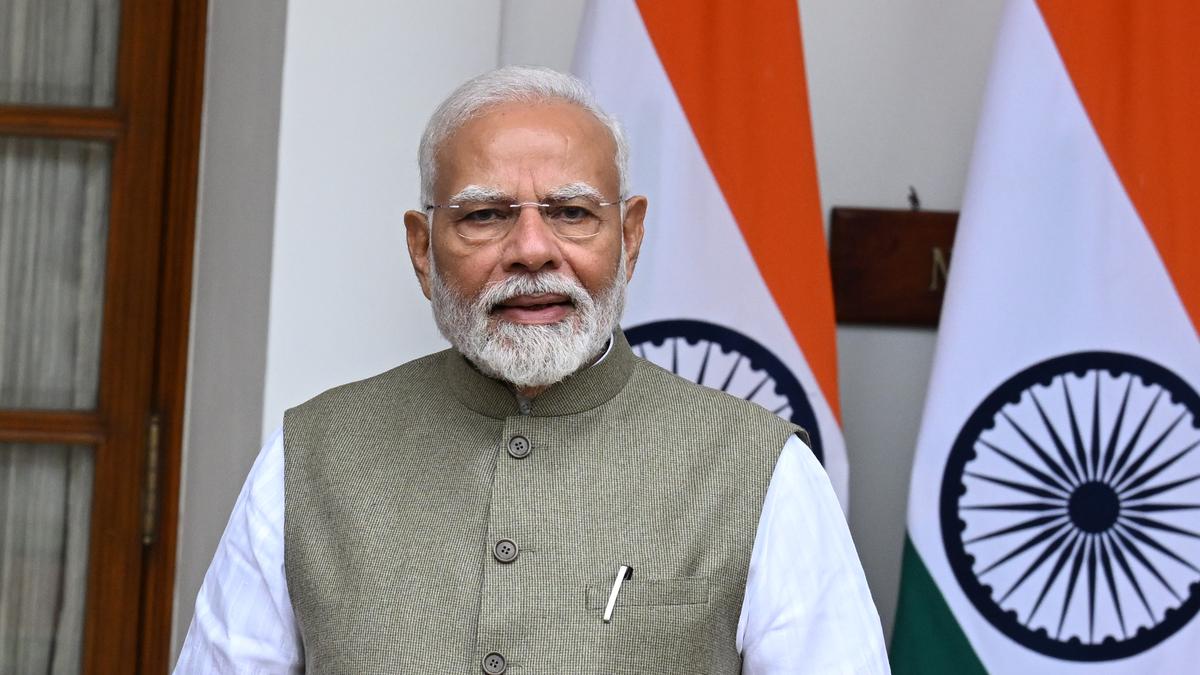File photo of Prime Minister Narendra Modi.
| Photo Credit: Sushil Kumar Verma
Prime Minister Narendra Modi may have repeated most of his Ministers from his previous term, as well as officials in his Prime Minister’s Office (PMO), but some policy prescriptions in his third term show departures from that term, a signal that he has taken political lessons from the Opposition’s Lok Sabha campaign to heart.
On Saturday (August 24, 2024), the Union Cabinet cleared the Unified Pension Scheme for Central government employees, which Information and Broadcasting Minister Ashwini Vaishnaw said would now make them eligible to receive as pension 50% of the average basic pay drawn over the last 12 months before superannuation. For this full pension or 50% of pay as the pension, he said, the eligibility length of service would be 25 years, adding, however, that it would be proportionate for a lesser period of service of up to a minimum of 10 years of service.
With this, the government hopes to trip at least one of the Opposition’s planks, especially of the Congress party, which had, in States where it held power, promised to implement the Old Pension Scheme (OPS), which assures a fixed amount of pension that is not dependent on market forces. The promise to implement the OPS had been a major plank for the Congress in the Himachal Pradesh Assembly election, which the party went on to win. However, both in Himachal Pradesh and in the then Congress-ruled Rajasthan, States that promised the implementation of the OPS, have not been able to get the job done as State finances have not allowed for it.

The Bharatiya Janata Party (BJP) has been resisting the OPS as it would, they said, reverse the process of pension reforms, with high costs to tax payers. With the UPS for Central government employees, the National Democratic Alliance (NDA) government has tried to address the core demands of employees, with fewer demands on the exchequer, as the UPS is contributory as well.
Mr. Modi, who met with the unions representing government employees, said his government’s move reflected its commitment to a secure future for government employees. “We are proud of the hard work of all government employees who contribute significantly to national progress. The Unified Pension Scheme ensures dignity and financial security for government employees, aligning with our commitment to their well-being and a secure future,” the PM said in a post on social media platform X.
The move will impact 23 lakh Central government employees. “With State polls coming up in Jammu and Kashmir, Haryana, Maharashtra and Jharkhand, all political parties will have to address the issue of pensions in their campaigns, whether or not, if they come to power, they will implement it,” a source in the government said. If States sign on to the UPS, the beneficiary base will explode to nearly 90 lakh people.
The decision by PM and the Union Cabinet to not implement a creamy layer classification for reservations for Scheduled Castes after a Supreme Court verdict on sub-classifications of SCs, and the decision on the UPS is being seen as a proactive measure by the BJP-led government to trip more Opposition planks. Therefore, while Mr. Modi has been projecting continuity from his second to his third term, in operative terms, that is not quite the case, with the UPS, after arguing for the market-linked New Pension Scheme in the past, a big example.






